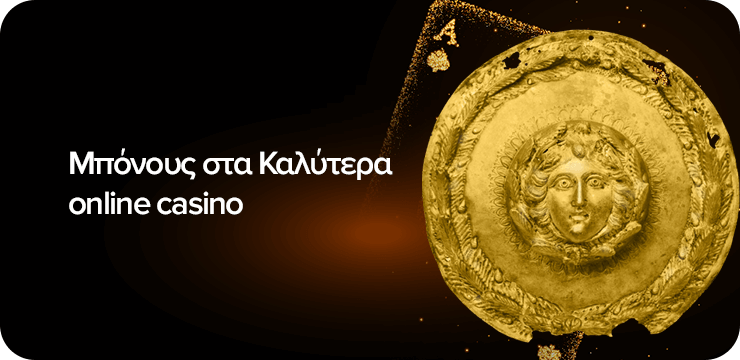Ο κόσμος των διαδικτυακών καζίνο έχει ανοίξει έναν κόσμο ψυχαγωγίας για τους παίκτες στην Ελλάδα. Οι εμπειρογνώμονές μας έχουν εξετάσει τον κόσμο των διαδικτυακών καζίνο, επικεντρώνοντας στην ελληνική αγορά, για να σας παρουσιάσουν έναν περιεκτικό οδηγό για τα καλύτερα casino online.
Τα καλυτερα online casino

Η περιήγηση στην ποικιλία των διαδικτυακών καζίνο μπορεί να είναι συντριπτική. Για να απλοποιήσουμε τις επιλογές σας, αναφέρουμε μια επιλεγμένη λίστα από τα κορυφαία καζίνο που έχουν κατακτήσει τις καρδιές των παικτών στην Ελλάδα:
| Online casino | Αριθμός Παιχνιδιών | Επιλογές Πληρωμής | Όρια Ανάληψης | Άδεια |
| Casinoly Casino | 1.000+ | Χρεωστικές/Πιστωτικές κάρτες, E-wallets, Προπληρωμένες κάρτες, κρυπτονομίσματα | €1.500 ανά ημέρα και €20.000 ανά μήνα | Curacao |
| Vulkan Vegas Casino | 2000+ | Χρεωστικές/Πιστωτικές κάρτες, E-wallets, Προπληρωμένες κάρτες | €10.000 ανά μήνα | Malta Gaming Authority |
| Wazamba Casino | 1500+ | Χρεωστικές/Πιστωτικές κάρτες, E-wallets, Προπληρωμένες κάρτες | €15.000 ανά μήνα | Curacao |
| Rabona Casino | 2500+ | Χρεωστικές/Πιστωτικές κάρτες, E-wallets, Προπληρωμένες κάρτες | €12.000 ανά μήνα | Curacao |
| National Casino | 1800+ | Χρεωστικές/Πιστωτικές κάρτες, E-wallets, Προπληρωμένες κάρτες | €9.000 ανά μήνα | Curacao |
| Neon54 Casino | 1200+ | Χρεωστικές/Πιστωτικές κάρτες, E-wallets, Προπληρωμένες κάρτες | €8.000 ανά μήνα | Curacao |
| Ice Casino | 900+ | Χρεωστικές/Πιστωτικές κάρτες, E-wallets, Προπληρωμένες κάρτες | €7.000 ανά μήνα | Curacao |
| Snatch Casino | 600+ | Χρεωστικές/Πιστωτικές κάρτες, E-wallets, Προπληρωμένες κάρτες | €6.000 ανά μήνα | Curacao |
Πλεονεκτήματα και Μειονεκτήματα των Καλύτερων online casino
Κάθε online casino έχει τα δυνατά του σημεία και τα αδύναμα. Ας εξετάσουμε τα πλεονεκτήματα και τα μειονεκτήματα από τα καλυτερα online casino :
|
Πλεονεκτήματα |
Μειονεκτήματα |
| Συναρπαστική Ποικιλία Παιχνιδιών | Όρια Ανάληψης |
| Επικερδή Μπόνους | Περιορισμένες Επιλογές Νομισμάτων |
| Φιλική Διεπαφή Χρήστη | |
| Ασφαλείς Συναλλαγές | |
| Υποστήριξη Πελατών |
Μπόνους στα Καλύτερα online casino

Τα casino online προσφέρουν εντυπωσιακές προσφορές μπόνους για να προσελκύσουν και να επιβραβεύσουν τους παίκτες τους. Είναι σημαντικό να κατανοήσετε τους διάφορους τύπους μπόνους που μπορείτε να συναντήσετε:
| Τύπος Μπόνους | Περιγραφή |
| Μπόνους Καλωσορίσματος | Αυτό το μπόνους το λαμβάνετε κατά την εγγραφή σας σε ένα καζίνο. Μπορεί να περιλαμβάνει μπόνους κατάθεσης και δωρεάν περιστροφές σε δημοφιλή παιχνίδια. |
| Μπόνους χωρίς Κατάθεση | Αυτός το μπόνους δίνεται σε νέους παίκτες χωρίς να απαιτείται κατάθεση. Είναι μια εξαιρετική ευκαιρία για να δοκιμάσετε τα παιχνίδια χωρίς να ρισκάρετε τα χρήματά σας. |
| Δωρεάν Περιστροφές | Αυτές οι περιστροφές μπορούν να χρησιμοποιηθούν σε συγκεκριμένα παιχνίδια κουλοχέρηδων. Συνήθως, παρέχονται ως μέρος του καλωσορίσματος πακέτου ή ως επιπλέον προσφορά για τους παίκτες. |
| Μπόνους Κατάθεσης | Αυτό το μπόνους δίνεται όταν καταθέσετε χρήματα στον λογαριασμό σας. Μπορεί να είναι σε μορφή ποσοστού της κατάθεσης σας ή σαν συγκεκριμένο ποσό. |
| Μπόνους Επαναφόρτισης | Αυτο τα μπόνους παρέχονται όταν επαναφορτίζετε τον λογαριασμό σας με χρήματα. Είναι ένας τρόπος για τα καζίνο να επιβραβεύσουν τους παίκτες που επιστρέφουν. |
Πώς να Επιλέξετε το Καλύτερο online casino;
Η επιλογή του κατάλληλου casino online ελλαδα είναι ζωτικής σημασίας για μια ευχάριστη και ασφαλή εμπειρία παιχνιδιού. Οι εμπειρογνωμονες μας έχουν δημιουργήσει μια λίστα κριτηρίων που μπορείτε να λάβετε υπόψη κατά την επιλογή του καλύτερου διαδικτυακού καζίνο:
- Αδειοδότηση και Ρύθμιση: Βεβαιωθείτε ότι το καζίνο έχει έγκυρη άδεια λειτουργίας από αξιόπιστη αρχή. Η άδεια διασφαλίζει τη νομιμότητα και τη διαφάνεια του καζίνο.
- Ποικιλία Παιχνιδιών: Ελέγξτε τη γκάμα των παιχνιδιών που προσφέρει το καζίνο. Επιλέξτε ένα καζίνο με μεγάλη ποικιλία από κουλοχέρηδες, επιτραπέζια παιχνίδια και live καζίνο.
- Μπόνους και Προσφορές: Εξετάστε τους τύπους μπόνους που προσφέρει το καζίνο, όπως καλωσορίσματος, δωρεάν περιστροφές και μπόνους επαναφόρτισης.
- Μέθοδοι Κατάθεσης και Ανάληψης: Βεβαιωθείτε ότι το καζίνο προσφέρει εύκολες και ασφαλείς μεθόδους για καταθέσεις και αναλήψεις χρημάτων.
- Ασφάλεια: Ελέγξτε τα μέτρα ασφαλείας που χρησιμοποιεί το καζίνο για την προστασία των προσωπικών σας δεδομένων και χρημάτων.
- Υποστήριξη Πελατών: Βεβαιωθείτε ότι το καζίνο προσφέρει επαγγελματική και φιλική υποστήριξη πελατών που είναι διαθέσιμη 24/7.
- Κινητή Εμπειρία: Ελέγξτε αν το καζίνο προσφέρει κινητή εφαρμογή ή διαδικτυακή πλατφόρμα για παιχνίδια σε κινητά και τάμπλετ.
- Ρυθμίσεις Στοιχημάτων: Βεβαιωθείτε ότι τα όρια στοιχημάτων και αναλήψεων ταιριάζουν στον προϋπολογισμό σας.
- Επαγγελματική Εμφάνιση: Η ποιότητα της ιστοσελίδας και η ευκολία χρήσης δείχνουν την προσοχή του καζίνο στη λεπτομέρεια.
Εξετάζοντας αυτά τα κριτήρια, θα είστε σε θέση να επιλέξετε το casino online ελλαδα που ταιριάζει στις προτιμήσεις και ανάγκες σας.
Ποια παιχνίδια προσφέρουν τα καλύτερα online casino;
Τα best casino online greece προσφέρουν μια ποικιλία εντυπωσιακών παιχνιδιών που καλύπτουν κάθε γούστο και προτίμηση παιχνιδιού. Ανάμεσα στα δημοφιλή παιχνίδια που μπορείτε να απολαύσετε περιλαμβάνονται:
- Κατηγορία Παιχνιδιών: Τα παιχνίδια στα online καζίνο μπορούν να χωριστούν σε διάφορες κατηγορίες, συμπεριλαμβανομένων των κουλοχέρηδων, των επιτραπέζιων παιχνιδιών, των βίντεο πόκερ, και των παιχνιδιών καζίνο Live.
- Κουλοχέρηδες: Οι κουλοχέρηδες είναι ένας από τους πιο δημοφιλείς τύπους παιχνιδιών σε online καζίνο. Είναι γνωστοί και ως παιχνίδια φρουτάκια και περιλαμβάνουν μια ευρεία ποικιλία θεμάτων και χαρακτηριστικών. Ορισμένοι από τους δημοφιλέστερους τίτλους περιλαμβάνουν τα Mega Moolah, Gonzo’s Quest, Book of Ra™ Deluxe Slot, 88 Fortunes Casino Slot Games και πολλούς άλλους.
- Επιτραπέζια Παιχνίδια: Στην κατηγορία αυτή συμπεριλαμβάνονται τα παιχνίδια όπως το πόκερ, το μπλακτζακ, και η ρουλέτα. Αυτά τα παιχνίδια προσφέρουν διασκέδαση και στρατηγική και είναι αγαπημένα μεταξύ των παικτών.
- Καζίνο Live: Τα παιχνίδια καζίνο Live σας επιτρέπουν να παίξετε με πραγματικούς dealers μέσω του διαδικτύου. Αυτό προσφέρει μια πιο αυθεντική εμπειρία καζίνο, καθώς μπορείτε να συμμετάσχετε σε παιχνίδια όπως το Live Blackjack και η Live Roulette.
- Βίντεο Πόκερ: Τα παιχνίδια βίντεο πόκερ είναι ιδανικά για όσους αγαπούν το πόκερ και θέλουν να δείξουν τις δεξιότητές τους. Περιλαμβάνουν διάφορες εκδοχές του πόκερ, όπως το Texas Hold’em.
- Φρουτάκια με Τζακποτ: Αυτά τα φρουτάκια προσφέρουν την ευκαιρία να κερδίσετε μεγάλα τζακποτ, που μπορεί να φτάσουν σε εντυπωσιακά ποσά. Είναι ιδιαίτερα δημοφιλή στους παίκτες που ψάχνουν για μεγάλα κέρδη.
Κινητή Έκδοση των Καλύτερων Online Καζίνο
Τα καλύτερα online casino προσφέρουν κινητές εφαρμογές και διαδικτυακές πλατφόρμες για το παιχνίδι σε κινητά τηλέφωνα και τάμπλετ. Μπορείτε να απολαύσετε τα αγαπημένα σας παιχνίδια οποιαδήποτε στιγμή και οπουδήποτε, διατηρώντας την ίδια ποιότητα και εμπειρία.
Πώς να Ξεκινήσετε να Παίζετε στα Καλύτερα online casino στην Ελλάδα;
Αφού επιλέξετε το best casino online greece για εσάς, είναι ώρα να ξεκινήσετε την περιπέτεια σας. Ακολουθήστε αυτά τα βήματα για να ξεκινήσετε:
- Εγγραφή: Δημιουργήστε έναν λογαριασμό στο καζίνο με τα προσωπικά σας στοιχεία.
- Κατάθεση: Χρηματοδοτήστε τον λογαριασμό σας με χρήματα χρησιμοποιώντας τις διαθέσιμες μεθόδους κατάθεσης.
- Επιλογή Παιχνιδιού: Επιλέξτε ένα παιχνίδι που σας αρέσει από τη γκάμα του καζίνο.
- Παιχνίδι: Ξεκινήστε το παιχνίδι και απολαύστε την εμπειρία!
Τώρα που γνωρίζετε πώς να ξεκινήσετε, είστε έτοιμοι να απολαύσετε τον κόσμο των διαδικτυακών καζίνο με ασφάλεια και ενθουσιασμό.
Τρόποι Κατάθεσης και Ανάληψης Χρημάτων στα Καλύτερα casino online Ελλάδα
Για να απολαύσετε την online παιχνιδική εμπειρία, είναι σημαντικό να γνωρίζετε πώς μπορείτε να διαχειριστείτε τα χρήματά σας σε αυτά τα καζίνο. Τα καλύτερα online casino στην Ελλάδα προσφέρουν διάφορες επιλογές:
- Κατάθεση: Καταθέστε χρήματα στον λογαριασμό σας χρησιμοποιώντας πιστωτικές κάρτες, ψηφιακά πορτοφόλια (e-wallets) και τραπεζικές μεταφορές.
- Ανάληψη: Όταν κερδίσετε, αναλάβετε τα χρήματά σας με τον τρόπο που σας εξυπηρετεί περισσότερο. Ελέγξτε τα όρια ανάληψης και τους χρόνους επεξεργασίας για κάθε μέθοδο προκειμένου να προγραμματίσετε την ανάληψή σας με βάση τις προτιμήσεις σας.
Παρακάτω θα βρείτε ένα πίνακα με κάποιες δημοφιλείς μεθόδους κατάθεσης και ανάληψης σε online καζίνο στην Ελλάδα, μαζί με εκτιμώμενους χρόνους ανάληψης:
| Μέθοδος Πληρωμής | Χρόνος Κατάθεσης | Χρόνος Ανάληψης | Πρόσθετες Πληροφορίες |
| Πιστωτικές/Χρεωστικές Κάρτες | Άμεσα | 2-5 εργάσιμες ημέρες | Ευρέως αποδεκτές, μπορεί να απαιτούν επαλήθευση. |
| Ψηφιακά Πορτοφόλια (π.χ. PayPal, Skrill, Neteller) | Άμεσα | Εντός 24 ωρών | Γρήγορες και βολικές, υποστηρίζονται ευρέως. |
| Τραπεζικές Μεταφορές | 1-3 εργάσιμες ημέρες | 3-7 εργάσιμες ημέρες | Ασφαλείς αλλά πιο αργές, μπορεί να συνοδεύονται από τέλη. |
| Προπληρωμένες Κάρτες (π.χ. Paysafecard) | Άμεσα | Δεν είναι διαθέσιμη | Ανωνυμία αλλά περιορισμένη σε καταθέσεις μόνο. |
| Κρυπτονομίσματα (π.χ. Bitcoin) | Άμεσα | Εντός 24 ωρών | Υψηλή ασφάλεια και δυνατότητα ανωνυμίας. |
Ασφάλεια και Υποστήριξη στα Καλύτερα casino online
Η ασφάλεια είναι πάντα προτεραιότητα όταν παίζετε online. Τα καλύτερα online casino προσφέρουν υψηλά πρότυπα ασφάλειας για την προστασία των προσωπικών και χρηματικών σας δεδομένων. Παρέχουν επαγγελματική υποστήριξη προς τους παίκτες τους, η οποία συνήθως περιλαμβάνει τη δυνατότητα επικοινωνίας μέσω live chat, email και τηλεφώνου, επιπλέον, παρέχουν επαγγελματική υποστήριξη προς τους παίκτες τους σε ποικίλες γλώσσες, ώστε να ανταποκρίνονται στις ανάγκες σας.
Συμπέρασμα
Τα καλύτερα online casino στην Ελλάδα προσφέρουν μια εντυπωσιακή εμπειρία για τους παίκτες. Με ποικιλία παιχνιδιών, επικερδείς μπόνους και ασφαλείς συναλλαγές, οι λάτρεις του καζίνο μπορούν να απολαύσουν ώρες διασκέδασης και πιθανά κέρδη. Μην ξεχνάτε να επιλέξετε το καζίνο που ταιριάζει καλύτερα στις ανάγκες και προτιμήσεις σας. Καλή διασκέδαση και καλή τύχη στα παιχνίδια!
FAQ(Συχνές Ερωτήσεις)
- Είναι νόμιμο να παίζω σε online casino στην Ελλάδα;
Ναι, αρκεί να επιλέξετε καζίνο που διαθέτει έγκυρη άδεια λειτουργίας από την αρμόδια αρχή.
- Πώς μπορώ να επιλέξω το best online casino;
Κοιτάξτε για άδεια, ποικιλία παιχνιδιών, μπόνους, ασφάλεια, υποστήριξη πελατών και ευκολία χρήσης.
- Ποιες μέθοδοι πληρωμής μπορώ να χρησιμοποιήσω;
Τα καλύτερα online casino προσφέρουν πιστωτικές κάρτες, e-wallets και τραπεζικές μεταφορές.
- Πόσο γρήγορα μπορώ να αναλάβω τα κέρδη μου;
Ο χρόνος επεξεργασίας για τις αναλήψεις διαφέρει ανάλογα με τη μέθοδο, αλλά τα καλά καζίνο επεξεργάζονται γρήγορα τις αναλήψεις.
- Υπάρχει κινητή έκδοση για τα online casino;
Ναι, τα καλύτερα online casino προσφέρουν κινητές εφαρμογές για παιχνίδια σε κινητά και τάμπλετ.




